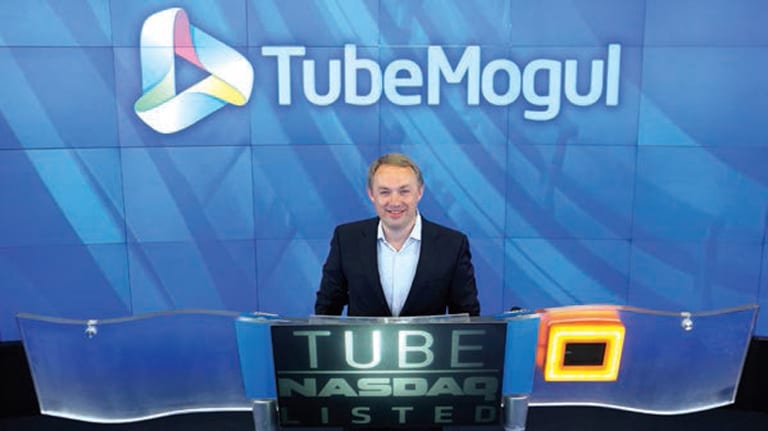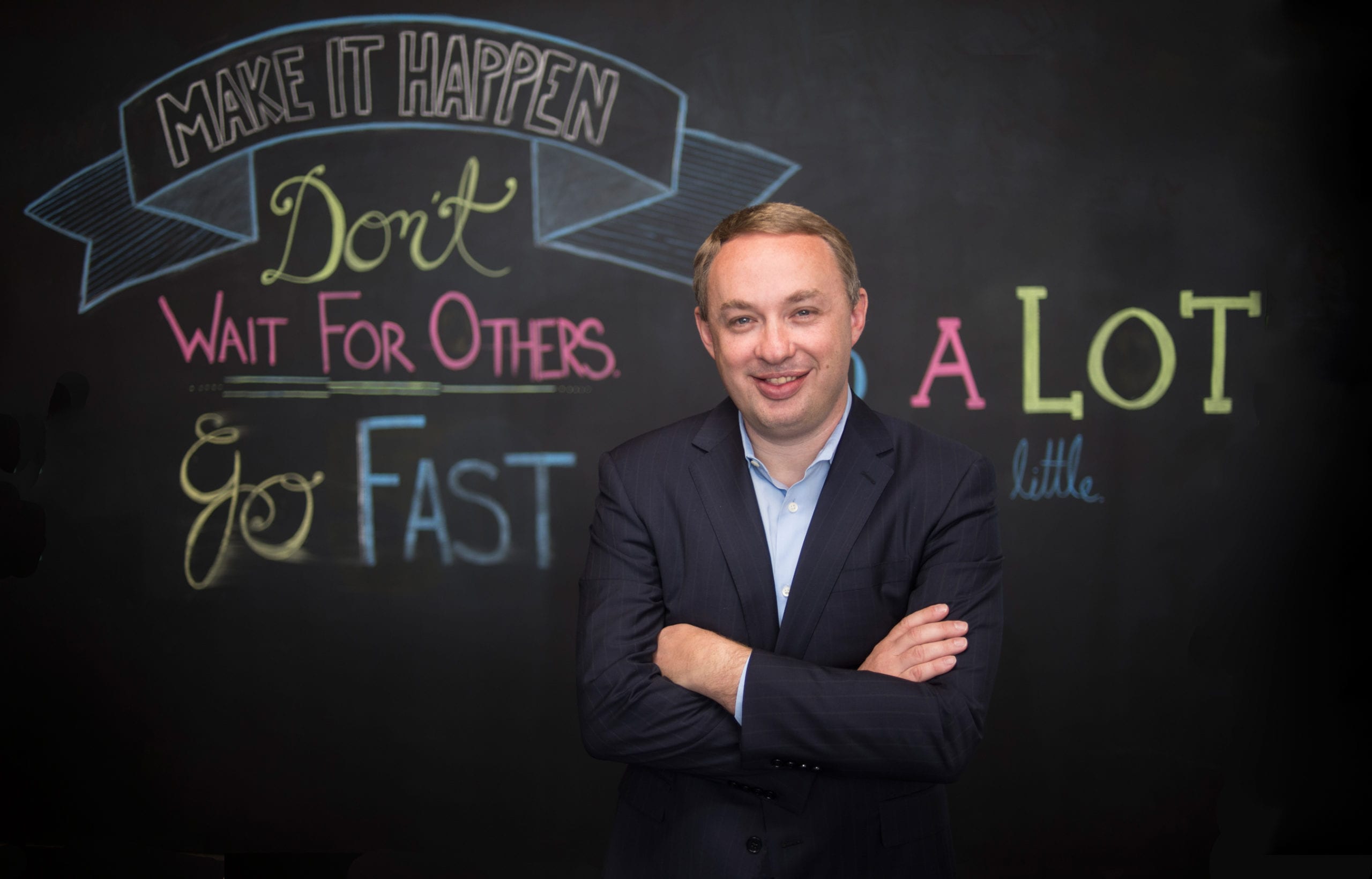TubeMogul Co-Founder Brett Wilson, MBA 07, revolutionized digital advertising by making it more simple, accountable, and transparent

It’s hard to believe that just ten years ago, watching video online was a novel concept. In that pre-YouTube era, dozens of burgeoning video sites battled for the attention of would-be internet content producers. Betting on any business model or technology was risky business. “There were no clear winners,” remembers Brett Wilson, MBA 07. “You had to go to each one and upload a different video file because of varying format requirements.”
When Wilson met fellow student John Hughes, MBA 07, in an entrepreneurship class, they saw an opportunity amid this uncertainty–for software that would bring order to the Wild West of online video and allow producers to focus on creating content rather than navigating specs. Recalls Wilson: “Instead of writing a business plan and presenting it, John said, ‘Let’s just build this thing.'”
The two spent the semester designing software for video uploading, with Hughes running product engineering and Wilson directing business operations. They got a boost winning a $22,500 prize in the UC Berkeley Business Plan Competition (now called LAUNCH), and took advantage of the Lester Center’s startup incubator, then in the basement of the Bancroft Hotel. “It was a pretty scrappy place, but it was a godsend to have space to hold meetings and take calls,” Wilson says. “There was no way we were starting a company had it not been for those resources.”
From such humble beginnings at Haas, Wilson and Hughes launched TubeMogul, which pivoted over the years into the first-ever software to automate the process for buying video advertising. As digital advertising has become increasingly complex, the service has brought much-needed transparency to the ad-buying process, cutting down on fraud and allowing producers to track exactly where their ad dollars are going and what impact their ads are having.
Wilson and Hughes grew the company into a tour de force, named one of the fastest-growing companies by Inc. and Deloitte and among the best places to work by Fortune, the San Francisco Business Times, and Glassdoor. They successfully took the company public in 2014 (NASDAQ: TUBE) and sold to Adobe in 2016 for $540 million. Wilson now serves as Adobe’s VP of advertising.
Amid his success, Wilson never forgot how Haas helped nurture the company in its early, difficult years. He mentors students and invests in Haas businesses, and he has become one of the youngest-ever members of the Haas School Board. This fall he received Berkeley Haas’ Leading Through Innovation Award, which honors groundbreaking alumni, for his unique foresight in transforming a dynamic industry.
Leaning on Haas
Wilson grew up in Green Bay and Chicago, where he became interested in business early, delivering papers, selling painted rocks to neighbors, and reading The Wall Street Journal. After attending Chico State for finance and marketing, he began his career as a consultant for Accenture and then, in the late 1990s, launched his first company: YouCanSave.com, an early e-commerce site that allowed consumers to buy direct at a discount. But he yearned to do something that would have a meaningful impact on an industry and enrolled in Haas to learn more about entrepreneurship.
“I wanted to find like-minded people,” he says, “and boy did I ever.” In fact, even as Wilson and Hughes took advantage of Haas’ entrepreneurial resources, they recruited heavily from the Haas orbit to make their company a success. Their first hire was classmate Mark Rotblat, MBA 07, and they found their CMO in Keith Eadie, MBA 08. They also scoured Cal job boards for engineers. “At the time we sold to Adobe, we were probably 650 employees, and I would guess that 200 or so of them had Cal degrees,” Wilson says.
Their first investor also came from Haas: classmate Michael Berolzheimer, MBA 07, the founder and managing partner of seed-stage investment fund Bee Partners, who saw something in the company from its earliest days. “I remember thinking the product was terrible– there was no market,” Berolzheimer says about Wilson and Hughes’ first pitch. Even so, he admired Wilson’s confidence and infectious enthusiasm. “He is a masterful communicator and can cross over between technology and business as well as anyone I’ve met since then.”
Changing an Industry
Despite the team’s promising concept, the company was far from an instant success. Their initial idea of software that would streamline posting to multiple video sites at once became less valuable as YouTube grew in dominance, and in the end it didn’t become the industry-changing idea Wilson and Hughes wanted to create.
“When we were honest with ourselves, it felt like we had a vitamin, not a painkiller,” Wilson says. “It didn’t feel like something that could change the world.” They tried another idea around video analytics, but that, too, fell flat. “TubeMogul wasn’t an overnight success story,” Wilson says. “It was a long, drawn-out adventure.”
Sustaining Wilson through the tough times was a focus on the values he had acquired at Haas, including the mindset of continually questioning the status quo. “At Haas, you have a group of people who really care about one another and who care about things deeper and bigger than just making money,” he says. Wilson discovered his opportunity to help people when he and Hughes looked more deeply into video advertising, an industry beset by middlemen who gave few details to companies about their advertising investments.

“There were rebates, kickbacks, and black boxes; often you didn’t know where your money was going,” Wilson says. TubeMogul’s platform, by contrast, allowed companies to eliminate those middlemen and make ad buys on their own, controlling where and when their ads appeared. More importantly, they could see the impact of those ads, with complex analytics that gauged what kinds of customers were seeing them and how they were responding.
“A lot of why we ended up succeeding is because we had a team that was incredibly mission driven and that loved the notion that we were a force for good.”
Soon after launching the platform in 2011, TubeMogul scored its first big clients, including Lenovo and Cadreon, a division of marketing giant IPG. Other companies such as L’Oreal and liquor conglomerate Diageo followed. Today, nearly 75 percent of video ad spending is conducted automatically from all platforms, up from 39 percent in 2015, according to digital analyst eMarketer. By 2020, that number is expected to top 80 percent. “We changed how an industry bought media,” Wilson says. “A lot of why we ended up succeeding is because we had a team that was incredibly mission driven and that loved the notion that we were a force for good.”
Soon after launching the platform in 2011, TubeMogul scored its first big clients, including Lenovo and Cadreon, a division of marketing giant IPG. Other companies such as L’Oreal and liquor conglomerate Diageo followed. Today, nearly 75 percent of video ad spending is conducted automatically from all platforms, up from 39 percent in 2015, according to digital analyst eMarketer. By 2020, that number is expected to top 80 percent. “We changed how an industry bought media,” Wilson says. “A lot of why we ended up succeeding is because we had a team that was incredibly mission driven and that loved the notion that we were a force for good.”
Values Driven
In addition to his work for the Haas School Board, Wilson frequently visits Haas classes and mentors new entrepreneurs–a true Beyond Yourself spirit. He often speaks to students about values, encouraging them to think big in creating something that can disrupt an industry while at the same time not losing sight of helping people in the process. “Often when you start a company, you’re trying to figure out a problem to solve, but it is your values that help you win,” he says. “They get you through the scary times that you will inevitably have.”
Receiving Haas’ Leading Through Innovation award is, for Wilson, a recognition that he has lived up to those principles in his career. “Haas is, in my mind, one of those institutions that gives us clarity when times are cloudy,” he says. “I really believe in the values that we stand for and to be acknowledged by the school for that is a real honor.”
